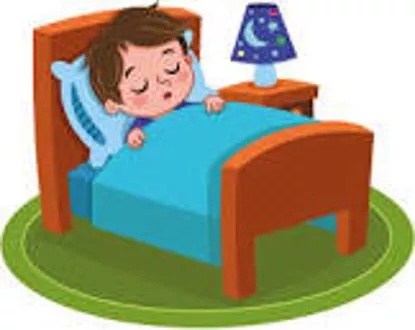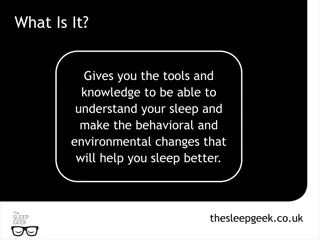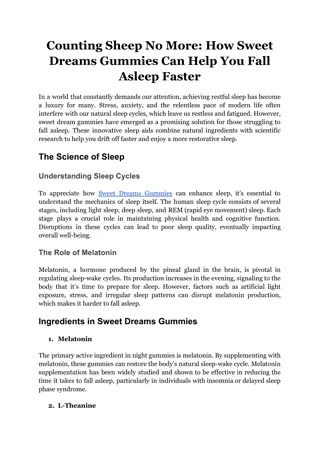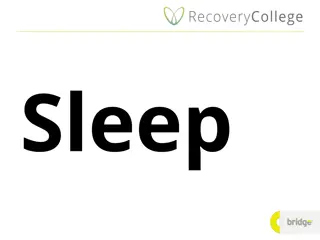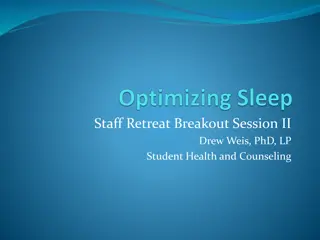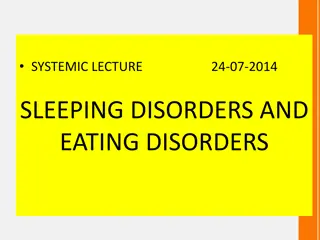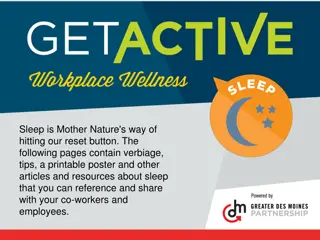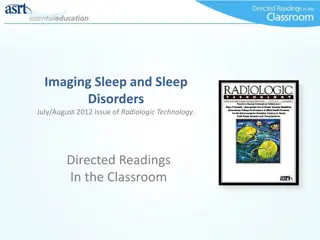The Science of Sleep: Understanding the Stages and Importance
Dive into the fascinating world of sleep with insights on the stages of sleep, fun sleep facts, and tips for a restful night's sleep. Learn about the different stages of sleep, the importance of quality sleep, and how it impacts brain development and overall well-being.
Download Presentation

Please find below an Image/Link to download the presentation.
The content on the website is provided AS IS for your information and personal use only. It may not be sold, licensed, or shared on other websites without obtaining consent from the author. Download presentation by click this link. If you encounter any issues during the download, it is possible that the publisher has removed the file from their server.
E N D
Presentation Transcript
WE ARE THE WE ARE THE OUR JOB IS TO Keep you safe online Keep you healthy online Make sure that you understand all the ways to keep yourself and others happy online
THIS PRESENTATION THIS PRESENTATION IS ABOUT IS ABOUT Screen Time And Sleep! In this presentation we will Share interesting facts about the science of sleep Introduce tips on how to get better sleep Share activities to do other than using devices Introduce your secret new challenge
THE THESCIENCE SCIENCE OF SLEEP SLEEP OF Stage One Falling Asleep: This is the start of your adventure to dreaming. You re just starting to drift asleep and your eyelids are closing. You can easily be woken up if alerted. Stage Two Light sleep: This is when you re starting to get into deeper sleep, deeper into your adventure. You will still not be dreaming yet . Your body is starting to relax, your heart rate is starting to slow. You can still be woken up easily. Sleep is like a journey of dreams and imagination. It takes several stages and each one is completely unique. These are the four stages: Stage Three Deep sleep This is when you re about half way through your adventure of sleep, the body starts to develop, such as healing wounds and growing. If someone wakes you up at this stage you can feel groggy. Stage four-REM Sleep (Rapid Eye Movement) REM sleep is where the most exciting part of your adventure happens. Your eyes move around quickly behind your closed eyelids, and this is when you have the most vivid and memorable dreams. It is also the stage where brain does a lot of learning and sorting through all the things you ve experienced during the day. Remember! That sleep is important, so make sure you get enough sleep every night to have the best adventures in your dreams and be your best in the day.
SLEEP FACTS SLEEP FACTS
Some birds sleep with one eye open to watch for predators, and dolphins and whales sleep with one half of their brain at a time. It s fascinating to learn about the different ways animals adapt to their sleep needs You dream every night! Even if you don t always remember them, you have a dream during every night when you go through REM. On average, people spend around one-third of their lives sleeping. This means that by the time you reach 90 years old, you will have spent about 30 years sleeping! Sleep is crucial for brain development, especially for children. During sleep, your brain processes information, forms memories, and helps you learn new things.
TIPS FOR A GOOD TIPS FOR A GOOD NIGHT S SLEEP NIGHT S SLEEP Caffeine and sugary snacks can keep you awake, so its good to avoid them in the evening. Go for a glass of water or a small, healthy snack if you are hungry. Try to go to bed and wake up at the same time every day, even on weekends. This helps regulate your body s internal clock and makes it easier to fall asleep and wake up. Establish a calming routine before bedtime, such as reading a book, taking a warm bath, or doing some light stretching exercises. Avoid stimulating activities like watching TV or playing video games close to bedtime. Regular physical activity during the day can help you fall asleep more easily at night. However, try to finish exercising at least a few hours before bedtime, as intense physical activity can make it harder to sleep right before bed. Ensure your bedroom is a comfortable and relaxing place to sleep. This means having a comfortable mattress and pillows, and keeping the room cool, dark and quiet. You can use blackout curtains to block out light and earplugs to reduce noise.
Activities you Activities you can do other can do other than using than using devices devices Read a book Do something creative Listen to the radio Listen to an audio book Devices and screen time can affect how well you sleep, so instead of using devices here are some things you can do instead:
The Turn off The Turn off and Tune In and Tune In Challenge Challenge The challenge will begin at some point over the term. You will all get a sheet to mark off everyday you take the pledge. The challenge will last two weeks and we will collect them in at the end.
Thank you for Thank you for listening listening
Any questions? Any questions? Any questions? Any questions?









